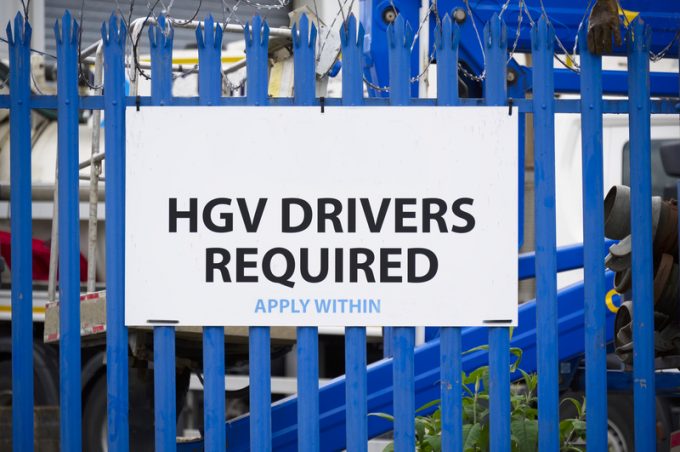SA: Saudi Arabia sovereign fund cuts FedEx stake, increases position in Prologis in Q3
SEEKING ALPHA reports: Saudi Arabia’s sovereign wealth fund in Q3 cut its stake in FedEx (NYSE:FDX), ...
UPS: MULTI-MILLION PENALTY FOR UNFAIR EARNINGS DISCLOSUREWTC: PUNISHEDVW: UNDER PRESSUREKNIN: APAC LEADERSHIP WATCHZIM: TAKING PROFITPEP: MINOR HOLDINGS CONSOLIDATIONDHL: GREEN DEALBA: WIND OF CHANGEMAERSK: BULLISH CALLXPO: HEDGE FUNDS ENGINEF: CHOPPING BOARDWTC: NEW RECORDZIM: BALANCE SHEET IN CHECKZIM: SURGING
UPS: MULTI-MILLION PENALTY FOR UNFAIR EARNINGS DISCLOSUREWTC: PUNISHEDVW: UNDER PRESSUREKNIN: APAC LEADERSHIP WATCHZIM: TAKING PROFITPEP: MINOR HOLDINGS CONSOLIDATIONDHL: GREEN DEALBA: WIND OF CHANGEMAERSK: BULLISH CALLXPO: HEDGE FUNDS ENGINEF: CHOPPING BOARDWTC: NEW RECORDZIM: BALANCE SHEET IN CHECKZIM: SURGING

As Europe looks to contend with a worsening driver shortage, a series of plans have been announced – but discussions with industry insiders suggest these efforts may have missed the point.
Both the IRU and the UK’s Road Haulage Association (RHA) are among industry bodies to announce moves to tackle the crisis.
Announcing the union’s plan today, IRU secretary general Umberto de Pretto said: “Driver shortages are quickly getting out of control.
“Balancing global labour supply and demand via simple measures to ease legal immigration and stop exploitation of non-resident drivers is one way to fix the problem and keep vital road transport services moving.”
It says a UN-developed global framework would protect non-resident drivers, improve conditions and increase social cohesion and harmonise qualification standards and cross-border recognition.
To facilitate this, governments would need to amend legislation and immigration procedures, recognise third-country qualifications via bilateral agreements, improve road transport laws and subsidise domestic training and integration programmes.
International Transport Federation general secretary Stephen Cotton said: “Governments, employers and the multinational customers of transport must work together with trade unions to build decent work to end driver shortages. Road transport will only attract and retain drivers if this is built on cooperation between all stakeholders to ensure decent work, labour rights and genuine social protections.”
According to the IRU, the present driver shortage across Europe exceeds 380,000, accounting for approximately 10% of demand with expectations that the shortfall will increase to a point where it matches 14% of demand as hauliers and governments seem unable to act.
News of the IRU’s global initiative follows the RHA’s launch of a driver simulator training project in Bathgate.
However, recent discussions with hauliers and transport operators suggest that these plans may miss the mark on what is required as a younger generation looks for a different lifestyle. SVP of FedEx Express’s European road network Martin Gussinklo said this month that “one of the central problems is changing mindsets between generations”.
“We know a major issue is the reticence of the younger generation to take on jobs that mean they are away from home for long periods,” he told The Loadstar.
Data from the IRU suggests ‘ageing out’ in Europe’s haulage sector could lead to a “demographic timebomb”, with the continent boasting the highest global driver age at 47.
Mr Gussinklo said everything from hiring rates to conversations in the community showed there had been a reassessment on “work-life balance” and the younger generation had decided truck driving as a job needed to change to attract them.
“We have to amend how we plan our routes. It would mean breaking trips down into legs to allow drivers to be away for a single night at most,” he explained.
IRU director of EU advocacy Raluca Marian told The Loadstar this was an “interesting idea for large operators”, and similar schemes were being considered by some IRU members.
But, she said, with most companies in the sector being SMEs, shorter-distance driver rostering could be hard for them to implement, while a spokesperson for the IRU said today’s plan would not alone solve the shortage and a focus on a wide range of solutions would be required.
“This new plan focuses on one aspect: easing immigration procedures for non-resident drivers and better protecting them when they are working abroad,” they told The Loadstar.
“Attracting young drivers into the profession is also crucial and there are many additional measures that need to happen to achieve this, from lowering qualification ages in many countries, helping with training and licence costs, and better awareness of the profession.
“More flexible ‘relay’ routing is another aspect of attracting younger drivers and IRU fully supports this, especially for larger operators who’ve the scale to plan routings in this way.”
Comment on this article